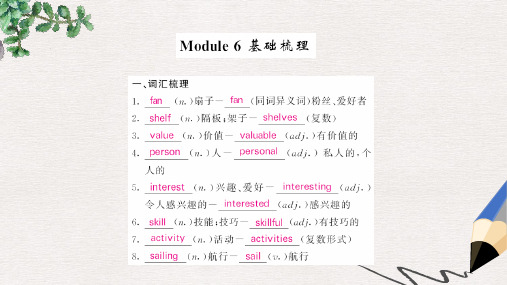2019年春八年级英语下册Module6Hobbies模块语法聚焦六课件(新版)外研版
合集下载
外研版八年级英语下册Module 6 Hobbies精品课件(共104张PPT)

【学以致用】 ①他在学校里当数学老师。 He works in the school ________a math teacher. ②你必须按照我要求你的去做每一件事。 You must do everything ________I asked you to. 答案: ①as ②as
3. have a look at v. 看一看; 查看 【语境领悟】 *Let me have a look. 让我看一看。 *Let’s have a look at your electronic computer. 让我们瞧一瞧你的电子计算机。
【自主归纳】have a look的用法 have a look意为“看一看; 看一下”, 相当于take a look, 后
面跟宾语时常加介词at, 即have/take a look at sth. 。
【归纳拓展】 look around look at look down look up look over look through look like look out
【自主归纳】as的用法 (1)as作介词, 意为“作为; 当作”。 (2)as作连词用, 意为“像; 按照; 当……的时候; 因为”。
【归纳拓展】由as构成的一些固定搭配。 ①as. . . as. . . “和……一样……”; ②as well as“同(一样也); 和; 还”; ③as a result“结果”。
13、He who seize the right moment, is the right man.谁把握机遇,谁就心想事成。2021/7/232021/7/232021/7/232021/7/237/23/2021
• 14、谁要是自己还没有发展培养和教育好,他就不能发展培养和教育别人。2021年7月23日星期五2021/7/232021/7/232021/7/23
八年级英语下册 Module 6 Hobbies模块语法聚焦六课件 (新版)外研版

much. ( C )6.My sister is very outgoing at school.
模块语法聚焦六
Ⅱ.连词成句 根据括号内的中文提示,将所给的英文意群连接成正确的句子。 1.picture, is, the, new, third(第3张图片是新的。)
__T_h__e__t_h_i_r_d__p_i_c_t__u_r_e__i_s__n_e_w_.____________________
模块语法聚焦六
( F )1.There is going to be a class meeting this afternoon.
( A )2.The bell is ringing. ( D )3.Tom bought me an umbrella yesterday. ( E )4.Music often makes me happy. ( B )5.Someone in our class likes singing very
模块语法聚焦六
2.主语+谓语(不及物动词)[+状语(副词、名词、介词 短语等)]. 此句型中的动词后不可以直接接宾语,这种动词称为不 及物动词。例如: His father cooks every day. 他父亲每天做饭。 The children are listening quietly. 孩子们在静静地听着。 He ran fast in the street. 他在街上跑得飞快。 The meeting begins at nine. 会议9点开始。
模块语法聚焦六
3.主语+谓语(及物动词)+宾语(+状语). 此句型中的动词可以直接接宾语,这种动词称为及物动 词。例如: He doesn’t like the film. 他不喜欢这部电影。 She often helps him. 她经常帮助他。 I have already finished reading the book. 我已经读完这本书了。
模块语法聚焦六
Ⅱ.连词成句 根据括号内的中文提示,将所给的英文意群连接成正确的句子。 1.picture, is, the, new, third(第3张图片是新的。)
__T_h__e__t_h_i_r_d__p_i_c_t__u_r_e__i_s__n_e_w_.____________________
模块语法聚焦六
( F )1.There is going to be a class meeting this afternoon.
( A )2.The bell is ringing. ( D )3.Tom bought me an umbrella yesterday. ( E )4.Music often makes me happy. ( B )5.Someone in our class likes singing very
模块语法聚焦六
2.主语+谓语(不及物动词)[+状语(副词、名词、介词 短语等)]. 此句型中的动词后不可以直接接宾语,这种动词称为不 及物动词。例如: His father cooks every day. 他父亲每天做饭。 The children are listening quietly. 孩子们在静静地听着。 He ran fast in the street. 他在街上跑得飞快。 The meeting begins at nine. 会议9点开始。
模块语法聚焦六
3.主语+谓语(及物动词)+宾语(+状语). 此句型中的动词可以直接接宾语,这种动词称为及物动 词。例如: He doesn’t like the film. 他不喜欢这部电影。 She often helps him. 她经常帮助他。 I have already finished reading the book. 我已经读完这本书了。
外研版八年级下册Module 6 Hobbies Unit 1 (共12张PPT)

Module 6 Hobbies Unit 1
Do you collect anything?
• What’s your hobby? • Why do you enjoy it? • When did you start it?
• His hobby is collecting toy cars. • His hobby takes up too much space. • There are many toy cars on the shelf. • His mother has to tidy up his room every day.
most space? • I think collecting toy cars takes up the most
space.
Listen and complete the notes
Lingling’s hobby: _c_o_lle_c_t_in_g__fa_n_s___ Betty’s hobbies:c_o_lle_c_t_in_g__c_oi_n_s,__n_otes stamps
• Collecting stamps can help people learn a lot about the world.
• Collecting old tickets can help people remember some wonderful places or moments.
notes
(4) _p_o_u_n_d_s and US (5) _d_o_ll_a_r_s. She also collects stamps from all over the world. Tony collects tickets, but Betty thinks that you cannot do anything with old tickets. Lingling thinks that people also enjoy collecting things to (6) _re_m__e_m_b__er_ something important in their lives.
Do you collect anything?
• What’s your hobby? • Why do you enjoy it? • When did you start it?
• His hobby is collecting toy cars. • His hobby takes up too much space. • There are many toy cars on the shelf. • His mother has to tidy up his room every day.
most space? • I think collecting toy cars takes up the most
space.
Listen and complete the notes
Lingling’s hobby: _c_o_lle_c_t_in_g__fa_n_s___ Betty’s hobbies:c_o_lle_c_t_in_g__c_oi_n_s,__n_otes stamps
• Collecting stamps can help people learn a lot about the world.
• Collecting old tickets can help people remember some wonderful places or moments.
notes
(4) _p_o_u_n_d_s and US (5) _d_o_ll_a_r_s. She also collects stamps from all over the world. Tony collects tickets, but Betty thinks that you cannot do anything with old tickets. Lingling thinks that people also enjoy collecting things to (6) _re_m__e_m_b__er_ something important in their lives.
八年级英语下册Module6Hobbies基础梳理课件外研版

⑥ 利用笔记抓住老师的思路。记笔记不仅有利于理解和记忆,而且有利于抓住老师的思路。
2019/7/11
最新中小学教学课件
6
谢谢欣赏!
2019/7/11
最新中小学教学课件
7
② 根据自己预习时理解过的逻辑结构抓住老师的思路。老师讲课在多数情况下是根据教材本身的知识结构展开的,若把自己预习时所理解过的知识 逻辑结构与老师的讲解过程进行比较,便可以抓住老师的思路。
③ 根据老师的提示抓住老师的思路。老师在教学中经常有一些提示用语,如“请注意”、“我再重复一遍”、“这个问题的关键是····”等等,这些 用语往往体现了老师的思路。来自:学习方法网
编后语
老师上课都有一定的思路,抓住老师的思路就能取得良好的学习效果。在上一小节中已经提及听课中要跟随老师的思路,这里再进一步住老师的思路。老师在讲课过程中往往会提出一些问题,有的要求回答,有的则是自问自答。一般来说,老师在课堂上提出的问 题都是学习中的关键,若能抓住老师提出的问题深入思考,就可以抓住老师的思路。
④ 紧跟老师的推导过程抓住老师的思路。老师在课堂上讲解某一结论时,一般有一个推导过程,如数学问题的来龙去脉、物理概念的抽象归纳、语 文课的分析等。感悟和理解推导过程是一个投入思维、感悟方法的过程,这有助于理解记忆结论,也有助于提高分析问题和运用知识的能力。
⑤ 搁置问题抓住老师的思路。碰到自己还没有完全理解老师所讲内容的时候,最好是做个记号,姑且先把这个问题放在一边,继续听老师讲后面的 内容,以免顾此失彼。来自:学习方法网
2019/7/11
最新中小学教学课件
6
谢谢欣赏!
2019/7/11
最新中小学教学课件
7
② 根据自己预习时理解过的逻辑结构抓住老师的思路。老师讲课在多数情况下是根据教材本身的知识结构展开的,若把自己预习时所理解过的知识 逻辑结构与老师的讲解过程进行比较,便可以抓住老师的思路。
③ 根据老师的提示抓住老师的思路。老师在教学中经常有一些提示用语,如“请注意”、“我再重复一遍”、“这个问题的关键是····”等等,这些 用语往往体现了老师的思路。来自:学习方法网
编后语
老师上课都有一定的思路,抓住老师的思路就能取得良好的学习效果。在上一小节中已经提及听课中要跟随老师的思路,这里再进一步住老师的思路。老师在讲课过程中往往会提出一些问题,有的要求回答,有的则是自问自答。一般来说,老师在课堂上提出的问 题都是学习中的关键,若能抓住老师提出的问题深入思考,就可以抓住老师的思路。
④ 紧跟老师的推导过程抓住老师的思路。老师在课堂上讲解某一结论时,一般有一个推导过程,如数学问题的来龙去脉、物理概念的抽象归纳、语 文课的分析等。感悟和理解推导过程是一个投入思维、感悟方法的过程,这有助于理解记忆结论,也有助于提高分析问题和运用知识的能力。
⑤ 搁置问题抓住老师的思路。碰到自己还没有完全理解老师所讲内容的时候,最好是做个记号,姑且先把这个问题放在一边,继续听老师讲后面的 内容,以免顾此失彼。来自:学习方法网
2019年春八年级英语下册Module6Hobbies模块基础知识过关六课件(新版)外研版

模块基础知识过关六
基础知识清单
重点单词 根据汉语提示或词形变化要求,写出相应的单词 1.邮票 n. ________ stamp 2.隔板;架子 n. ________ shelf →(复数) ________ shelves 3.一定;肯定 v. aux. ________ must 4.值钱的;有价值的 adj. ________ valuable →(n.)价值;有用性 ________ value with without 5.用…… prep. __________→(反义词 ) ________ interest 6.兴趣;爱好 n. __________→(adj.) ___________(修饰人) interested →(adj.)______________ interesting (修饰物)
volleyball and table tennis. have a look 8.Let me ________________ at your new watch. tidy up 9.Please ________________ your bedroom. It's a bit of a mess. looking forward to visiting the Great Wall again. 10.We are _____________________
7.在某人的一生中 _________________ in one's life such as/for example 8.例如 _____________________
grow vegetables 9.种植蔬菜 ________________
10.照看动物 _____________________ look after animals
基础知识清单
重点单词 根据汉语提示或词形变化要求,写出相应的单词 1.邮票 n. ________ stamp 2.隔板;架子 n. ________ shelf →(复数) ________ shelves 3.一定;肯定 v. aux. ________ must 4.值钱的;有价值的 adj. ________ valuable →(n.)价值;有用性 ________ value with without 5.用…… prep. __________→(反义词 ) ________ interest 6.兴趣;爱好 n. __________→(adj.) ___________(修饰人) interested →(adj.)______________ interesting (修饰物)
volleyball and table tennis. have a look 8.Let me ________________ at your new watch. tidy up 9.Please ________________ your bedroom. It's a bit of a mess. looking forward to visiting the Great Wall again. 10.We are _____________________
7.在某人的一生中 _________________ in one's life such as/for example 8.例如 _____________________
grow vegetables 9.种植蔬菜 ________________
10.照看动物 _____________________ look after animals
- 1、下载文档前请自行甄别文档内容的完整性,平台不提供额外的编辑、内容补充、找答案等附加服务。
- 2、"仅部分预览"的文档,不可在线预览部分如存在完整性等问题,可反馈申请退款(可完整预览的文档不适用该条件!)。
- 3、如文档侵犯您的权益,请联系客服反馈,我们会尽快为您处理(人工客服工作时间:9:00-18:30)。
模块语法聚焦六
二、句型说明 英语句子以谓语为中心,谓语的前面是行为的执行者, 后面接动作的承受者(被动语态除外)。状语可置于句首,也 可以置于谓语之后。一般来说,置于句首的多是时间、条件 和原因状语,置于谓语之后的多是地点、方式、目的和伴随 状语。
模块语法聚焦六
实战演练 Ⅰ.判断下列各句属于A—F中的哪种句型,把选项填在题前 的括号内 A.主语+谓语(+状语) B.主语+谓语+宾语(+状语)
模块语法聚焦六
Ⅱ.连词成句 根据括号内的中文提示,将所给的英文意群连接成正确的句子。 1.picture, is, the, new, third(第3张图片是新的。) The third picture is new. ________________________________________________ 2.mother, asked, not, me, my, to, play computer games(我妈 妈让我不要玩电脑游戏。) My mother asked me not to play computer games. ________________________________________________ 3.picture, I, yesterday, drew, the(我昨天画的画。) I drew it yesterday/ Yesterday I drew it. ________________________________________________ 4.under the tree, some, there are, children( 树下有些孩子。) There are some children under the tree. ________________________________________________ 5.popular, a, is, singer, he(他是一位受欢迎的歌手。) ________________________________________________ He is a popular singer.
模块语法聚焦六
Ⅲ.翻译句子 1.Tony喜欢集邮。 Tom likes collecting stamps. ________________________________________________ 2.妈妈让我收拾卧室。 Mum made/let me tidy up my bedroom. ________________________________________________ 3.这些模型很漂亮。 These models are beautiful. ________________________________________________ 4.昨天他们没有去公园。 ________________________________________________ They didn't go to the park yesterday. 5.上周我叔叔送给我一盒巧克力。 My uncle gave me a box of chocolates last week. ________________________________________________ /My uncle gave a box of chocolates to me last week. ________________________________________________ 6.教室里有一台电脑。 There is a computer in the classroom. ________________________________________________
模块语法聚焦六
简单句的基本句型 教材典句 1.David Smith is a student. 戴维•史密斯是个学生。 2.It came out as a book in 2012. 它在2012年作为一本书出版了。 3.David wrote a story about the life of a sixteenyearold boy. 戴维写了一个关于十六岁男孩的故事。 4.Hobbies can make you grow as a person. 爱好可以促使你成长。 5.I'll show you my stamps too. 我也将给你看看我的邮票。 6.There was a writing class. 有一门写作课。
模块语法聚焦六
4.主语+谓语(及物动词)+间接宾语+直接宾语(+状 语). 此句型中的及物动词后接两个宾语(双宾语),即指人的间 接宾语和指物的直接宾语。通常情况下,间接宾语在前, 直接宾语在后。有时,间接宾语也可与介词to或for构成 短语,放在直接宾语的后面。例如: Please give me a few apples. =Please give a few apples to me. 请给我几个苹果。
模块语法聚焦六
语法探究 英语是一种结构型语言,以谓语动词为核心构成句型。 一、常见的六种基本句型: 1.主语+系动词+表语(+状语). 此句型中,系动词除了be动词外,常见的还有look(看起 来), sound(听起来), taste(尝起来), feel(感觉;摸起 来), smell(闻起来), become (变得), turn(变得), get(变得)等,系动词后接形容词或名词作表语。例如: Your watch looks very nice. 你的手表看起来很漂亮。 The days get shorter and shorter. 白天变得越来越短了。 In spring, the trees turn green. 春天,树变绿了。
模块语法聚焦六
3.主语+谓语(及物动词)+宾语(+状语). 此句型中的动词可以直接接宾语,这种动词称为及物动 词。例如: He doesn’t like the film. 他不喜欢这部电影。 She often helps him. 她经常帮助他。 I have already finished reading the book六
2.主语+谓语(不及物动词)[+状语(副词、名词、介词 短语等)]. 此句型中的动词后不可以直接接宾语,这种动词称为不 及物动词。例如: His father cooks every day. 他父亲每天做饭。 The children are listening quietly. 孩子们在静静地听着。 He ran fast in the street. 他在街上跑得飞快。 The meeting begins at nine. 会议9点开始。
C.主语+系动词+表语(+状语) D.主语+谓语+间接宾语+直接宾语(+状语) E.主语+谓语+宾语+宾语补足语(+状语) F.There+be+主语(+状语)
模块语法聚焦六
( F )1.There is going to be a class meeting this afternoon. ( A )2.The bell is ringing. ( D )3.Tom bought me an umbrella yesterday. ( E )4.Music often makes me happy. ( B )5.Someone in our class likes singing very much. ( C )6.My sister is very outgoing at school.
模块语法聚焦六
5.主语+谓语(及物动词)+宾语+宾语补足语(+状 语). 宾语补足语用来补充说明宾语的行为、特征或状态等, 宾语和宾语补足语之间通常有逻辑上的主谓关系。例 如: He made all of us laugh. 他使我们都大笑起来。 At first I found Chinese quite hard. 起初我发现汉语相当难。 6.There+be+主语(+状语). 此句型中,be 动词的单复数由后面的主语决定。当有两 个或两个以上的主语时,be动词的数与离其最近的主语 的数保持一致,即遵循“就近原则”。例如: There are some people in the hall. 大厅里有些人。 There is a pen and some books on the desk. 书桌上有一支钢笔和一些书。
